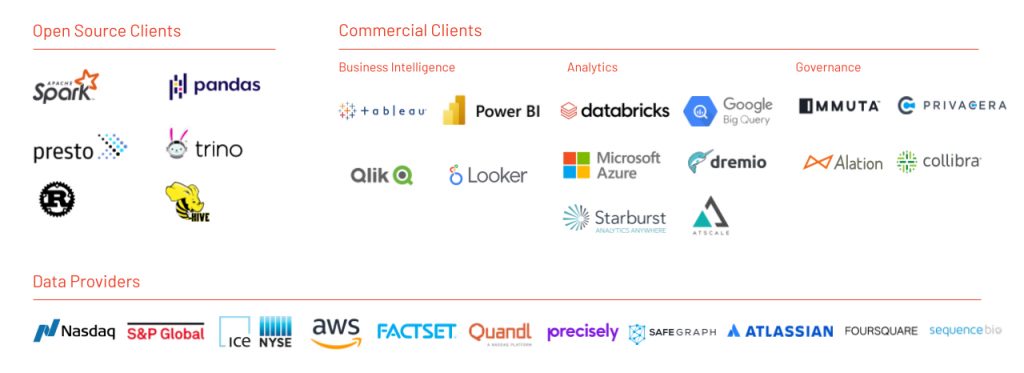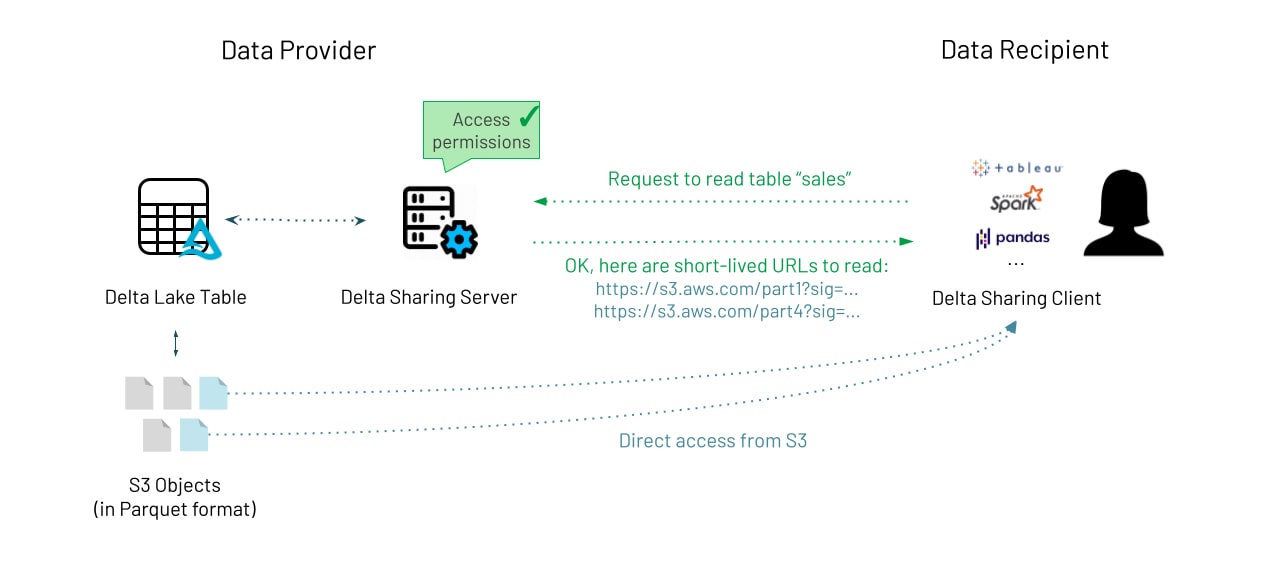

Update: Delta Sharing is now generally available on AWS and Azure.
Get an early preview of O'Reilly's new ebook for the step-by-step guidance you need to start using Delta Lake.
Data sharing has become critical in the modern economy as enterprises look to securely exchange data with their customers, suppliers and partners. For example, a retailer may want to publish sales data to its suppliers in real time, or a supplier may want to share real-time inventory. But so far, data sharing has been severely limited because sharing solutions are tied to a single vendor. This creates friction for both data providers and consumers, who naturally run different platforms.
Today, we’re launching a new open source project that simplifies cross-organization sharing: Delta Sharing, an open protocol for secure real-time exchange of large datasets, which enables secure data sharing across products for the first time. We’re developing Delta Sharing with partners at the top software and data providers in the world.
To see why today’s data sharing solutions create friction, consider a retailer that wants to share data with an analyst at one of its suppliers. Today, the retailer could use one of several cloud data warehouses that offer data sharing, but then the analyst would need to work with their IT, security, and procurement teams to deploy the same warehouse product at their company, a process that can take months. Furthermore, once the warehouse is deployed, the first thing the analyst would do is export the data from it into their favorite data science tool, such as pandas or Tableau.
With Delta Sharing, data users can directly connect to the shared data through pandas, Tableau, or dozens of other systems that implement the open protocol, without having to deploy a specific platform first. This reduces their access time from months to minutes, and greatly reduces work for data providers who want to reach as many users as possible.
We’re working with a vibrant ecosystem of partners on Delta Sharing, including product teams at the leading cloud, BI and data vendors:

Delta Sharing Ecosystem
In this post, we’ll explain how Delta Sharing works and why we’re so excited about an open approach to data sharing.
Delta Sharing is designed to be easy for both providers and consumers to use with their existing data and workflows. We designed it with four goals in mind:
Delta Sharing is a simple REST protocol that securely shares access to part of a cloud dataset. It leverages modern cloud storage systems, such as S3, ADLS or GCS, to reliably transfer large datasets. There are two parties involved: Data Providers and Recipients.
As the Data Provider, Delta Sharing lets you share existing tables or parts thereof (e.g., specific table versions of partitions) stored on your cloud data lake in Delta Lake format. A Delta Lake table is essentially a collection of Parquet files, and it's easy to wrap existing Parquet tables into Delta Lake if needed. The data provider decides what data they want to share and runs a sharing server in front of it that implements the Delta Sharing protocol and manages access for recipients. We’ve open sourced a reference sharing server; and we provide a hosted one on Databricks, as we imagine other vendors will.
As a Data Recipient, all you need is one of the many Delta Sharing clients that supports the protocol. We’ve released open source connectors for pandas, Apache Spark, Rust and Python, and we’re working with partners on many more.

The actual exchange is carefully designed to be efficient by leveraging the functionality of cloud storage systems and Delta Lake. The protocol works as follows:
The Delta Sharing design provides many benefits for both providers and consumers:
As previously mentioned, we are excited about establishing an open approach to data sharing. Data providers, like Nasdaq, have uniformly told us that it is too hard to deliver data to diverse consumers, all of which use different analytics tools.
"We support Delta Sharing and its vision of an open protocol that will simplify secure data sharing and collaboration across organizations. Delta Sharing will enhance the way we work with our partners, reduce operational costs and enable more users to access a comprehensive range of Nasdaq’s data suite to discover insights and develop financial strategies,” said Bill Dague, Head of Alternative Data, Nasdaq.
With Delta Sharing, dozens of popular systems will be able to connect directly to shared data so that any user can use it, reducing friction for all participants. We are working with dozens of partners to define the Delta Sharing standard, and we invite you to participate.
Many of these companies extended their support for today’s launch:
BI Tools: Tableau, Qlik, Power BI, Looker
Analytics: AtScale, Dremio, Starburst, Microsoft Azure, Google BigQuery
Governance: Collibra, Immuta, Alation, Privacera
Data Providers: FactSet, Nasdaq, Precisely, Safegraph, Atlassian, AWS, Foursquare, ICE, Qandl, S&P, SequenceBio
Databricks customers will have a native integration of Delta Sharing in our Unity Catalog, providing a streamlined experience for sharing data both within and across organizations. Administrators will be able to manage shares using a new CREATE SHARE SQL syntax or REST APIs and audit all accesses centrally. Recipients will be able to consume the data from any platform. Sign up to join our waitlist for preview access and updates.

This first version of Delta Sharing is just a start. As we develop the project, we plan to extend it to sharing other objects, such as streams, SQL views or arbitrary files like machine learning models. We believe that the future of data sharing is open, and we are thrilled to bring this approach to other sharing workflows.
To try the open source Delta Sharing release, follow the instructions at delta.io/sharing. Or, if you are a Databricks customer, sign up for updates on our service. We are very excited to hear your feedback!